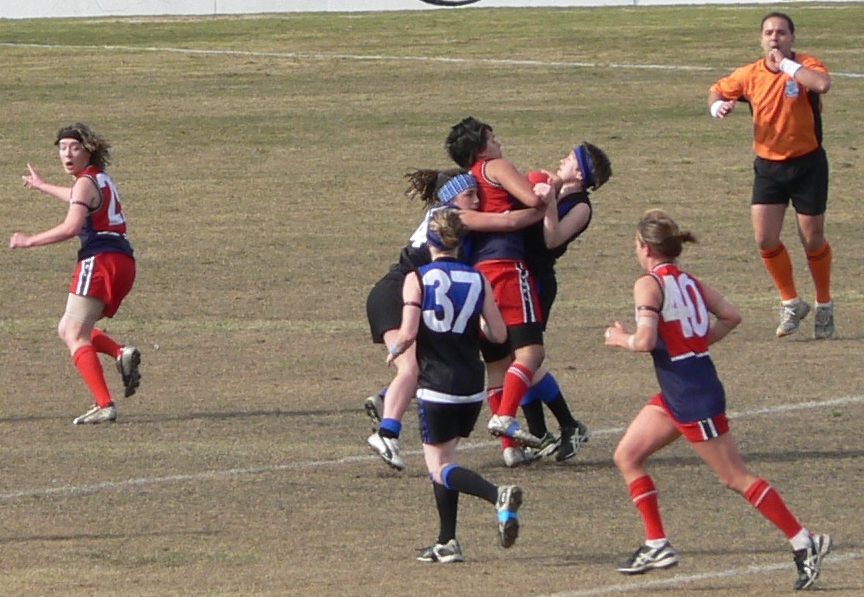In the 2005 Falcons Annual Report, senior coach Peta Searle wrote that “you’re only as good as your next game so let’s be ready for a kick ass 2006”. It was a rousing statement that would foreshadow the beginning of one of the most successful eras for Aussie rules at the club.
In 2005, the VWFL restructured the league, introducing a Division One Reserves competition. Darebin elected to field a team in this competition along with a team in the Division One Seniors. The restructure at league level was mirrored at the Falcons with Peta Searle taking over from Kerry Saunders and Laurel Gore stepping into the reserves coaching role. After a tough couple of seasons on-field and a tumultuous beginning to the 2005 season with the Falcons effectively homeless for much of the year, it was nonetheless a season that marked a turning point for the club. Success seemed to ‘[grow] from thin air’ wrote football administrator Bronwyn Evans in the 2005 annual report.
“With all of the off field setbacks the groups of 62 football playing members just seemed to gel. Both teams attacked the field and each training session with such passion and tenacity. This season we set field with a leadership team that provided the players with an array of knowledge and skills. The club was alive and before we realised we were winning games and winning them well.”
—Bronwyn Evans/Football Administrator
Peta Searle would go on to coach the Falcons to five consecutive flags as senior coach. But her path back to the nest was anything but easy. After a season and career-ending injury in 2004, Peta had retired from the game.
“And then Nikki Graves rang me just after I had my surgery and said, ‘Oh, can you coach the club?’ And I was like. ‘No’,” Peta recalled. “Like, I was not remotely interested in coaching the club. I was interested in coaching, but certainly not Darebin. And a lot of it was around the lack of professionalism [and] the fact that I didn’t feel welcomed as a player… so I was like, ‘Yeah, I’m not, I can’t coach this group’.” Nicole Graves wasn’t about to give up that easily. Peta describes the then president as “quite persistent”. That persistence paid off.
Daisy Pearce, who played in every one of the five premierships Peta Searle coached at Darebin said that during that 2005 season, Peta worked hard to “change the culture and environment of the club”.
“I remember something Pete [said], just that she wanted to make the club somewhere that she’d be proud to bring her family. And I think that was a really important step for the club moving forward into the era that we are in now. Because you look [back] and you do kind of reflect on how far women’s footy [has] come and—without blowing the club’s trumpet—I think Darebin has been a really big part of that growth in women’s footy because they’ve had some amazing leaders and just a great culture and all along the way they set the standard both on the field and off it in how to carry yourselves.”
Peta was famously strong on “standards of behavior outside of the club.. because that’s what drives standards inside the club as well and that’s what brings good people to your club.” It seemed to work. Both the senior and reserves teams made it to the grand final in 2005. While neither came home with a flag, what they did return to the nest with was a desire to go one better the next year.
Louise Potter was injured in the final round of the 2005 home and away season, so she missed those grand finals. But she sees them as a significant step forward for the club. “It was like, oh wow, this is what playing football is all about, you know, playing in the grand final. We lost that game but we were totally the underdogs that year so to get to the grand final was a massive step up from the previous two.”
“We got beat pretty convincingly in that Grand Final from memory, which started to create a bit of belief in that, you know, what Pete was bringing in was starting to work,” Daisy said. “And I think also, I think from memory, we might have gotten Sarah Hammond and Macca (Anna McIlroy) over in that 2006 season… getting those kind of recruits across from another club, people that did want to really apply themselves and try and take their footy to another level [were] starting to look at what Pete was doing and that cultural thing at Darebin and wanting to be a part of it.”
The following season would mark the beginning of five consecutive premierships. A win over Melbourne University in the grand final was the beginning of a period of remarkable success.
“Even winning that in 2006,” Louise said. “You would not have known from that what sort of dominance that club was going to have.”
Over the following four seasons, the Falcons would cement that dominance in both the senior and reserves grades. The senior team was undefeated from 2007 to 2010. Not to be outdone, the reserves team were also undefeated in 2007 and brought home their first premiership, winning decisively against St Kilda. By 2009, Rohenna Young was coaching the reserves and they tackled the 2009 season determined to make amends for their 2008 grand final loss—they did so convincingly.
Despite the impressive string of wins the two teams were stringing together in this period, Jane Lange said it “felt like each year was a fresh challenge”.
“People used to always say, you know, especially after the second or third or the eighth or whatever, like people would always say ‘Don’t you get sick of winning?’” she recalled. “But I just feel like that drive within the group and within the club to kind of just be the best that you can be. It just overrode all of that stuff.”
In the midst of such success, the club could be forgiven for resting on its laurels. But for Peta, “there’s always something to work on and to strive for”. She doesn’t recall thinking about the success at the time. “But to look back now and reflect, I haven’t won a grand final since. Lost two as a coach at Port Melbourne. Haven’t made one since being at St Kilda. So yeah, like, now you look back at it and go, ‘Wow, that was pretty impressive’. To be that good for that long, was a real testament to the group… over that five years or six years, there’s a lot of people [who] should be proud of what their contribution was throughout [those] six years.”
Like Peta, Daisy says the remarkableness of what they were doing wasn’t something she thought a lot about at the time. “It’s more now when you play more and more and more footy and you just realise how much it takes to win one. All the things you’ve got to do that are within your control, and then all the other bits that have to fall your way as well. Like it’s bloody hard to do. So to do it five years in a row.”
The defining part of the run of premierships from 2005 to 2010 was the way in which Peta shaped the culture of the club. From on-field behavior to off-field, Peta was trying to create an environment where “you would be proud to bring your family”. The success, Daisy believes, “kind of just stems from that”.
“I mean, she was amazing, Pete. I remember… she’d come back to Darebin with all the drills she’d found by going out and sitting at AFL training. The league at that time, back in early to mid-2000s, wasn’t really demanding that kind of professionalism or competition but Pete was always trying to find an edge and she was going out and finding all this extra information and bringing it back and then had this amazing leadership style that created these standards and things we all had to meet, whether you were the best player or not the best player. She started trying to really create that environment, even though the league didn’t yet demand it,” Daisy said.
The 2010 season would be another momentous season for the club with the senior, reserves and youth girls all winning premierships. It would also be the end of an era with Peta Searle stepping down as senior coach.
“It was a massive period for the club,” recalls Louise. “A lot of teams were really, I mean, you can understand, were really a bit sick of Darebin winning. But when you’re involved in that… you just want to keep winning.
“It was an amazing period, that time. So good to be involved, and good to be part of.”
While the on-field success continued to reach higher and higher points, off-field, that success created challenges for the administration of the club.
“Everything just became harder,” Trish Riddell recalled. “For your coaching, the staff, the demands of players, the trainers… I don’t think people really thought [about] how much was involved in running the club and the soccer, the cricket, the 8 Ball, the youth girls.
“I mean, if only you knew what it took to get here. And I suppose for a lot of the older girls that were there it was, yeah, sometimes it was tough but sometimes we’d sit back in awe and think ‘Wow, look what we’ve been able to achieve’.”

